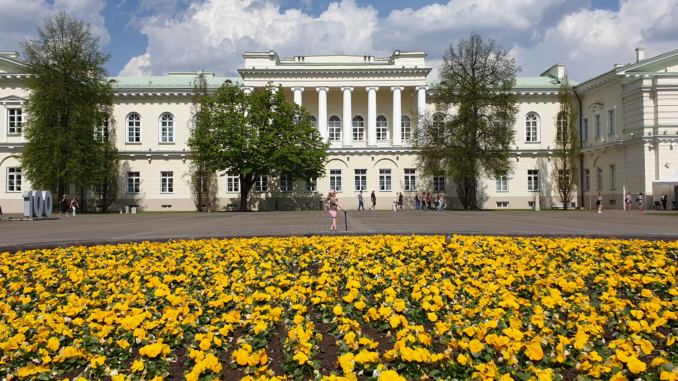
Bernadras Gailius / lzinios.lt
The presidential elections are highlighting a new quality political reality of Lithuania, where people are divided into supporters of oligarchy and democracy, instead of conservatives, social democrats and liberals, as it used to be.
It is still a long way to go until this division will be reflected in the names of parties or will lead to real changes in the legal framework of Lithuania. But it can already be clearly seen that a completely new question has become increasingly evident over the last two decades – can general elections still be trusted? How do we imagine a voter: a conscious person just like me, or a brainless and lowbrow resident of the ‘other Lithuania’?
The response (not necessarily loudly voiced) to this question generates two opposing systems of opinions (not necessarily loudly declared). Either the state belongs to all citizens, or it should (at least de facto) be run by the most prosperous, frequently described by the euphemism ‘the most successful’, individuals.
Candidates who pay on a new ground
Three most conspicuous presidential candidates are already playing on this new ground. Ingrida Šimonytė aspires to communicate with voters as a ‘person to a person’. Saulius Skvernelis represents the party of the main aspiring oligarch Ramūnas Karbauskis. Gitanas Nausėda is trying to think over every word and to stay somewhere between these two poles. The strategy of Mr. Nausėda is not necessarily the worst one. The newly-elected president will have to cope with both world views since they both are already here – in the new political reality of Lithuania.
Sometimes it seems that the scale is tipped in favour of oligarchs, but they themselves do not think so. They feel that the time for putting their cards on the table has not come yet. The real policy that was born following the record-breaking victory of the “Farmers” at the Seimas elections back in 2016 probably revealed to contenders for oligarchs that society is not entirely ready for their revolutionary ideas. The media is still strongly in opposition, agitating the indifferent ones is difficult, while thoughtful ones are usually not responsive to oligarchy.
The best litmus test is Visvaldas Matijošaitis. Considered by observers as a very important presidential candidate or at least supporter of candidates, this business and policy tycoon finally opted for a bird in the hand and decided to continue consolidating his position in the fortress of Kaunas.
Investigations launched by LRT journalists and the Chief Official Ethics Commission on the influence of Mr. Matijošaitis on Kaunas Municipality to adopt decisions possibly favourable for his business shows that his decision was probably very well-thought-out. This ‘sixth sense’ of potential oligarchs is a very important indicator democracy having more vitality than it may appear at first glance.
Political parties are still alive
The fact that the party system has not been completely killed yet probably is the most important thing in the political arena. Despite consistently decreasing financing of the parties, attempts to discredit them in public, the parties still are a very important structural element of the political system. Even oligarchy supporters, despite escalating the idea of ‘apolitical politics’ in their speeches, are still forced to unite into a true nearly classical party. Besides, the oligarchy party that evolved on the basis of farmers without limiting to them can unite even stronger in the future and emerge as a party.
Lauras Bielinis’ comment about the approaching European Parliament elections should be remembered regarding this: ‘People will vote for party lists. Parties with high ratings can expect more while low-rated parties can expect nothing’. Thus, until oligarchs can change the Constitution, essentially they are forced to play a party game – similarly, like communists once in Western Europe.
Another important challenge on the road of oligarchy is opposition of small and medium business. This business is developed by people who in true oligarchy should ‘know their place’: working directly for oligarchs or what is allowed by oligarchs. Some signs show that representatives of small and medium business start to understand the fragility of their position in modern Lithuania and feel, at least intuitively, growing injustice in their business environment. For example, representatives of small and medium business demonstrated the strongest response to the Government’s plans to assign EUR 5 million for promotion of employment for the long-term unemployed, by organising motivational courses for them and employing ‘case managers’.
Small business and corruption
Entrepreneurs described this idea very accurately – a waste of money. With grievances directly related to business accumulating, small and medium businessmen can strengthen the pro-democracy camp significantly or even become its foundation. Besides, the unexpected radically changing allegedly clear situation must always be expected in politics.
Corruption cases can bring significant harm to the success of oligarchy party. It destroys the image of a combat against corrupted elite that is being carefully built by the “Farmers” and their allies. The latest case of judges comes as an evident example. Differently from the situation with the MG Baltic case, the “Farmers” could not pin the blame on someone else this time. The involvement of their ally Ričardas Malinauskas is already clear, and even some other ‘skeletons in the closet’ of the “Farmers” can come to light. Such unexpected turns are the daily reality in politics. Therefore, the ratio between oligarchy and pro-democracy supporters cannot be seriously assessed until the new president of Lithuania is elected.

Be the first to comment